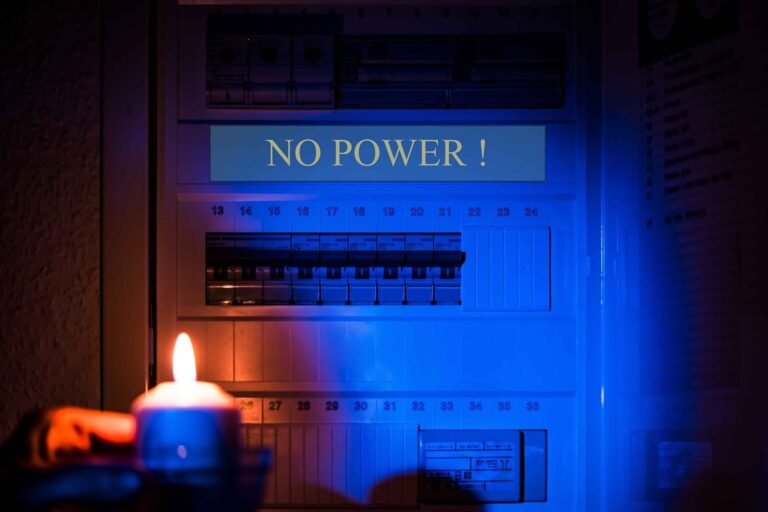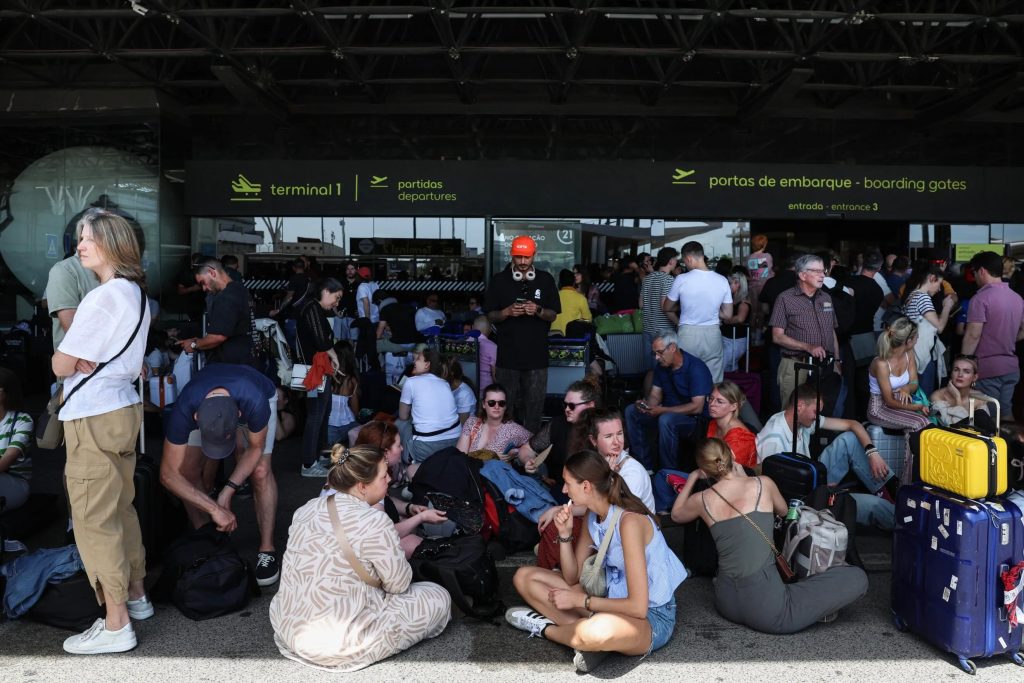Why did the lights go out in Spain and Portugal? And what does it mean for Europe, its power grids and its electricity?

29 April 2025 — “Something very weird has happened”. Those are the exact words used last night by Aitor Hernández-Morales, an expert in both power grids and Iberian affairs, as by late Monday evening it became clear it would take longer than expected to restore power in Spain and Portugal.
Some 15 gigawatts of power vanished from Spain’s electricity grid during five seconds on Monday, triggering the massive blackout that left the Iberian peninsula in the dark for the rest of the day. That’s equivalent to 60% of the total being consumed nationwide at that time. “This has never happened before,” said Spain’s Prime Minister Pedro Sánchez.
By 5 a.m. this morning, Spanish transmission system operator Red Eléctrica announced just over 92% of the country’s power supply had been restored. But authorities told Spaniards to avoid transport and only use their cell phones for short calls today.
And saying what everybody was thinking: “Is this a cyberattack? A terrorist attack?” Nobody is sure. Spain’s Prime Minister Pedro Sánchez said
“What caused it is something that the experts have not yet established, but they will. No hypothesis has been rejected, and every possible cause is being investigated”.
But most experts I spoke to said “well, it is really technical, and nerdy”. As they explained it, the sudden drop in available power destabilized Spain’s electricity grid, which is highly integrated with Portugal’s and linked to the rest of Europe through a small number of cross-border interconnections with France. According to Eduardo Prieto, director of Red Eléctrica, that “strong oscillation in the electrical network” led Spain’s power system to “disconnect from the European system, and the collapse of the Iberian electricity network at 12:38.”
For readers who want to get into the technical aspects of power grids and power outages, Alexander Stahel (who really knows his stuff) led a chat last night and then posted his main points on Twitter.
And it was turmoil on the ground: some people were trapped in trains, people were unable to lock their shops (electronic gates), or pay for basic necessities. Plus there was a severe impact of the security of the data centre sector. Some back-up systems worked, but many did nor.
And it offered some “I-told-you” moments for some key politicians. EU Crisis Management Commissioner Hadja Lahbib was mocked for advising Europeans to pack a 72-hour emergency kit as part of the EU’s preparedness strategy. Many said they should have prepared one of those 72-hour survival kits, with the Spanish newspaper El Mundo reporting a massive run on all of the supplies recommended by Lahbib.
Or Sánchez’s comment last month that Spain’s greatest threat was not Russia bringing its troops across the Pyrenees to the Iberian peninsula, but rather cyber and terrorist attacks. He argued that that cyber defenses and climate spending should count toward Spain’s 2% GDP spending commitment for NATO. That was met with eye-rolls by capitals on the front lines. Not today.
If Ukraine jumped on the opportunity to make a friendly point about shared threats. “Our technical experts are ready to help,” President Volodymyr Zelenskyy told Sánchez in a call. On Twitter he posted:
I spoke with the Prime Minister of Spain about the emergency situation in the energy system. No matter what happens, we are always ready to assist and support our friends. Over the years of war and Russian attacks on our energy system, Ukraine has gained significant experience in overcoming any energy challenges, including blackouts. Our specialists can join recovery efforts. I offered such assistance to Spain. I instructed Ukraine’s Minister of Energy to act as swiftly as possible. Our technical experts are ready to help.
Over the longer term, this historic outage is sure to reignite a geeky debate with major implications for European integration. The Commission, along with Lisbon and Madrid, have pushed to better connect the Iberian peninsula to the rest of the continent – but there’s been resistance. And this blackout isn’t likely to settle the argument: A more integrated grid could have saved Spain and Portugal – or it could have turned the outage into a continental contagion (see further points below).
And, boy, a timely discussion. EU environment ministers meet in Poland today to talk about the response to a rising tide of disinformation aimed at the bloc’s energy policies and divestment from fossil fuels.

Sitting it out in Madrid airport yesterday
One of my staffers in Spain was stuck on a train for 6 hours, unable to communicate because all mobile phone infrastructure was down. Another, in Lisbon, was trapped in the metro for hours. Same issue. No mobile communications.
The frantic search to figure out what, exactly, caused Spain and Portugal to lose power on Monday, leaving millions of people without access to basic modern necessities, will result in an answer – that will certainly have serious ramifications for the two countries, and for Europe as a whole.
The EU has been pressing the Iberian Peninsula, which has long operated as an energy island within the bloc, to link up better to Europe’s grids. Already on Monday, specialists were debating whether such connections could have helped prevent the massive blackouts — or put more countries at risk of experiencing spillover effects.
And there was the usual hand-wringing throughout the day about whether the outages were the work of cyber-saboteurs launching a strike on Europe — even as no evidence emerged suggesting that was the case. As I noted above, late yesterday afternoon, Eduardo Prieto, director of Spanish transmission system operator Red Eléctrica, said the blackout was caused by a “very strong oscillation in the electrical network” that led Spain’s power system to “disconnect from the European system, and the collapse of the Iberian electricity network at 12:38″.
A press conference by Spanish Prime Minister Pedro Sánchez late on Monday evening presented more questions than it answered. Looking grave and warning that it may take longer to restore power than originally anticipated, the Socialist leader said: “This has never happened before”. Authorities in both countries declined to hypothesize as to what might have caused the imbalance in the power system.
Restoring power to Spain and Portugal has been no easy task. According to Alexander Stahel (see my link above), grid operators have to follow a technically very complicated process to get the energy system up and running again. Both countries have to restore supplies step by step,, first by relying on special generators, like hydroelectric pumps.
Neighboring countries are also chipping in, with French grid operator RTE supplying 700 megawatts of electricity to Spain within hours of the blackout. The lights were back on in most of the Iberian Peninsula’s northernmost and southern regions by the late afternoon, thanks in part to power supplies from France and Morocco. The power systems are connected through “interconnectors”. This means that there is interdependency between the networks, but also that they will have to be restarted separately.
As the two networks have gone down they will have to be re-powered, which means that the grid operator will slowly bring on key generators matched with users (so that production and consumption of electricity match) in regions of the network that slowly expand, until the whole system is back on and can then be reconnected to external networks.
Spain and Portugal have tightly linked power systems with few cross-border links to France and the rest of the EU. The European Commission, the EU’s executive, has long wanted to change that fact, strongly encouraging EU countries to build more interconnections. Officials argue the move would improve energy security and ease electricity flows across borders. Madrid, Lisbon and Paris have repeatedly signaled a willingness to move forward with that plan, but advances have been slow.
Although Spain and France are now finally forging ahead with a new link in the Basque country, the EU’s energy regulator association warned last year that not enough electricity transmission capacity has been freed up, despite legal requirements to do so. It remains unclear whether more connections to Europe would have ameliorated the blackout:
• On one hand, more cross-border links could have strengthened Spain’s ability to balance supply and demand and import electricity. Madrid’s current limited trading capacity with France constrains rapid response capabilities during large-scale disturbances.
• Conversely, increased connectivity might risk propagating frequency instability into neighboring systems, creating a domino effect of cascading blackouts across other EU countries.
Could this have been a cyberattack? For now, the grid experts are discounting this. But it was raised because Spain’s opposition to Israel’s war in Gaza and its support for Ukraine against Russia’s aggression have made it a major target for cyberattacks, and throughout the day there was heightened speculation that the crisis could be the result of nefarious action.
In 2015, Russian-linked hackers knocked down a chunk of Ukraine’s power grid. But to bring down the electricity grid of two EU countries would be a vastly different prospect, in terms of both the technical effort required and the bellicose implications of such an attack.
And why are people talking about green energy and its impact? Spain and Portugal are champions of green energy in the EU, and were sourcing over 80% of their electricity from renewables just before the outage hit on Monday. Experts have previously said that the rapid expansion of wind and solar power is putting increased pressure on the Spanish grid, which is in need of an upgrade to handle record volumes of intermittent renewables.
But green energy was not to blame for Monday’s blackout, say experts, since the EU has in recent years enforced several sets of rules, like updated grid connection codes from 2016, to prevent renewable power generators from disconnecting from the network in a way that endangers the system. The nature and scale of the outage makes it unlikely that the volume of renewables was the cause, with the Spanish network more often than not subject to very high volumes of such production. There was sufficient conventional generation available, with nuclear, hydro, cogeneration and thermal technologies all on the system prior to the event, available to the operator.